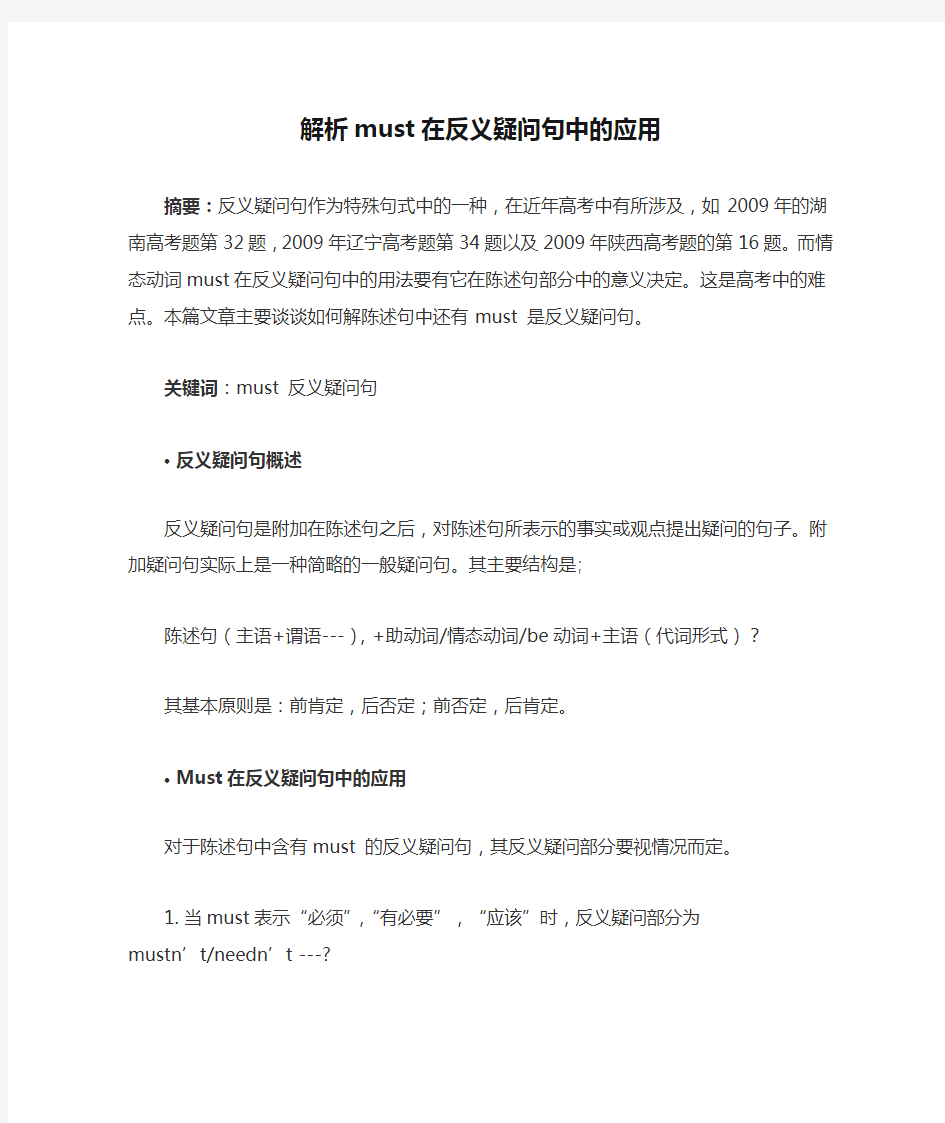
解析must在反义疑问句中的应用
- 格式:doc
- 大小:34.00 KB
- 文档页数:4


解析must在反义疑问句中的应用
摘要:反义疑问句作为特殊句式中的一种,在近年高考中有所涉及,如2009年的湖南高考题第32题,2009年辽宁高考题第34题以及2009年陕西高考题的第16题。而情态动词must在反义疑问句中的用法要有它在陈述句部分中的意义决定。这是高考中的难点。本篇文章主要谈谈如何解陈述句中还有must 是反义疑问句。
关键词:must 反义疑问句
∙反义疑问句概述
反义疑问句是附加在陈述句之后,对陈述句所表示的事实或观点提出疑问的句子。附加疑问句实际上是一种简略的一般疑问句。其主要结构是;
陈述句(主语+谓语---),+助动词/情态动词/be动词+主语(代词形式)?
其基本原则是:前肯定,后否定;前否定,后肯定。
∙Must在反义疑问句中的应用
对于陈述句中含有must 的反义疑问句,其反义疑问部分要视情况而定。
1. 当must表示“必须”,“有必要”,“应该”时,反义疑问部分为
mustn’t/needn’t ---?
Eg: We must study hard at Engish, mustn’t/needn’t we?
You must finish your homewo rk in a hour, mustn’t/needn’t you?
You mustn't stop your car here, must you?
They must finish the work today, needn't they?
1. 当must表是推测时,分四种情况
1. 对现在情况的推测,反义疑问部分与must后面的动词相呼应:
是be动词,反义疑问部分用isn’t/aren’t---?是实义动词用
don’t/doesn’t---?
Eg: you must be joking, a ren’t you?
He must be ill, isn’t he?
You must know the answer to the exercise, don't you?
(2)对过去动作的推测,此时must的表现形式为must have done,
a). 单纯表示对过去的推测(一般句中有明确的过去时间状语),
与现在无关, 反意疑问句附加部分“didn't---?”。
b). 表示对过去的推测且影响到现在或持续现在(一般没有明确
的过去时间状语), 反意疑问句附加部分用“haven't/hasn't---?”。
e.g. He must have come yesterday, didn't he?
She must have read the novel last week, didn't she?
Aunt Liu must have got to the U.S.A. yesterday, didn't she?
You must have studied English for years, haven't you?
He must have lived here at least ten years, hasn't he?
You must have left your bag in the theatre, haven't you?
(3) 对过去状态的推测
此时,must的表现形式为“must have been”,反义疑问部分的动词为wasn’t/weren’t---?
Eg:He must have been a policeman, wasn’t he?
Your father must have b een a brave boy many years ago, wasn’t he?
(4). 对将来的推测,反义疑问部分用won’t---?
It must be going to rain tomorrow,won,t it?
三、解题思路
由于must 在反义疑问句中的用法由它在陈述句部分中的意义决定,因此解题的关键在于判断must 的含义.因此,在解题时,有以下几个步骤。第一步:判断must 是表必须,还是表推测。表必须,反义疑问部分用mustn’t/needn’t ---?
第二步:判断must是对何时情况的推测。
对现在情况的推测,反义疑问部分用isn’t/aren’t/don’t/doesn’t---?
对过去动作的推测, 反义疑问部分用“haven't/hasn't/didn’t---?
对过去状态的推测, 反义疑问部分用wasn’t/weren’t---?
对将来的推测,反义疑问部分用won’t---?
四、典型例题
1. 2011年安徽省“江南十校”高三联考英语试卷的第34题
The Greens must have been to 2010 Shanghai
Expo,__________they?
Ahadn’t B. didn’t C.can’t D. weren’t
解析:这道题主要考察的是must在反义疑问句中的应用。
由must在这里的表现形式为must have been判断,是对过去状态的推测,所以很容易得出正确答案为D.
学生易错点:
很多同学在做这道题时,选择了A或B。
选A的同学,主要原因在于未能弄清must 后的主要动词是谁,误认为是have.
其实have在这里只是构成时态的助动词而已。那是不是可以认为若must 后的主要动词时have的话,就可以用hadn’t 了呢?答案为否。比如,看下面的一个例句: